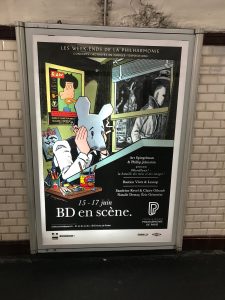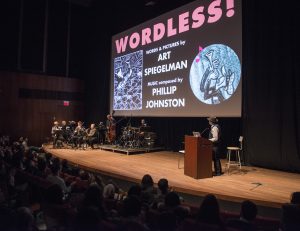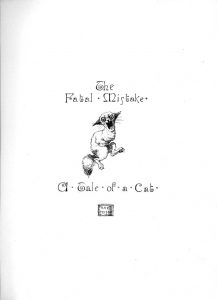 Wordless! words by Art Spiegelman, music by Phillip Johnston
Wordless! words by Art Spiegelman, music by Phillip Johnston
A video introduction to Wordless! , an intellectual vaudeville.
The Wordless! Tumblr.
In his Pulitzer prize-winning masterpiece, MAUS—a moving father-son memoir about the Holocaust drawn with cats and mice—Art Spiegelman changed the definition of comics forever. In WORDLESS!, a brand new and stimulating hybrid of slides, talk and musical performance, he probes further into the nature and possibilities of his medium.

Spiegelman, noted as a historian and theorist of comics as well as an artist, collaborates with Phillip Johnston, the critically acclaimed jazz composer who wrote all-new scores he will be performing live with his sextet, The Silent Six.
Johnston’s music accompanies the cartoonist’s personal tour of the first legitimate “graphic novels”— silent picture stories made by early 20th century masters like Frans Masereel, Lynd Ward and Milt Gross—and their influence on him. As Spiegelman explores “the battle between Words and Pictures”, he smashes at the hyphen between High and Low Art in a presentation featuring a new work drawn specifically for this project, “Shaping Thought.”
 Spiegelman has been named one of Time’s “100 Most Influential People” and his work has been translated into over 25 languages. He co-edited the influential magazine RAW with his spouse and frequent collaborator, Françoise Mouly, and has created many covers for The New Yorker. Spiegelman’s most recent book is CO-MIX, A Retrospective of Comics, Graphics and Scraps.
Spiegelman has been named one of Time’s “100 Most Influential People” and his work has been translated into over 25 languages. He co-edited the influential magazine RAW with his spouse and frequent collaborator, Françoise Mouly, and has created many covers for The New Yorker. Spiegelman’s most recent book is CO-MIX, A Retrospective of Comics, Graphics and Scraps.
Phillip Johnston is best known for his work as a jazz composer (Microscopic Septet, Big Trouble, Fast ‘N’ Bulbous), film composer (The Music of Chance, Noise) and creator of music for silent films, most recently Lotte Reiniger’s 1927 animated feature, The Adventures of Prince Achmed. The Microscopic Septet’s forthcoming CD on Cuneiform Records is called I’ve Been Up So Long It Looks Like Down To Me: The Micros Play The Blues.
“…Spiegelman delights in undermining stuffy theory, letting Johnston’s music burst in to express his joy on seeing the stories that flash before us . . . Spiegelman creates mystery in the play between his lecture and Johnston’s music. It’s disorienting, but as he warned us at the beginning, that’s part of the point.”
––Paul Blacklund, Paris Review